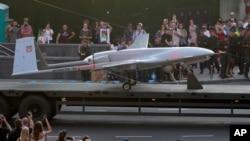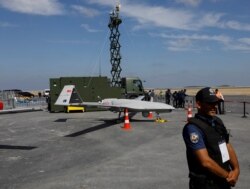U.S.-backed Kurdish forces in Syria say they are increasingly concerned about a wave of Turkish drone attacks against their commanders in northeast Syria.
Turkey reportedly carried out dozens of airstrikes last week, including several with unmanned aerial vehicles, against positions belonging to the Syrian Democratic Forces (SDF), a Kurdish-led military alliance that has been a major U.S. partner in the fight against the Islamic State group, also known as IS or ISIS.
Turkey views the SDF and its main element, the People's Protection Units (YPG), as an extension of the Turkey-based Kurdistan Workers' Party (PKK), a militant group given a terrorist designation by Washington and Ankara. The U.S., however, makes a distinction between the two Kurdish groups.
"Turkey has recently increased its drone attacks against our military points and commanders throughout northeast Syria, in places like Kobani, Tell Tamer and most recently in Qamishli," said Shervan Darwish, a spokesperson for the SDF-affiliated Manbij military council.
"The current political climate doesn't help Turkey to wage a large-scale ground operation, so instead they use drones and airstrikes to expand their operations," he told VOA.
The SDF said a Turkish drone strike killed one of its high-ranking commanders near the city of Qamishli on Sunday. Several other SDF commanders were targeted last week in another reported Turkish drone attack on the SDF-held town of Tell Tamer.
Turkey's foreign ministry did not respond to a VOA request for comment. But pro-government Turkish media outlets have reported on Turkish drone attacks in recent days against SDF commanders in northeast Syria.
Turkey's defense ministry has also said its armed forces have "neutralized" Kurdish fighters in northeast Syria, without specifying how they were targeted.
Turkish military and allied Syrian militias have been in control of parts of northeast Syria since October 2019, following a major military campaign against SDF fighters.
Since then, the U.S. and Russia have sponsored separate cease-fire deals between the warring sides.
US 'deeply concerned'
On Monday, a U.S. State Department spokesperson told VOA on background that "the United States is deeply concerned about reports of increased military activity in northeast Syria," adding that Washington supports the "maintenance of the current cease-fire lines and urge(s) all parties to de-escalate."
In a bipartisan letter addressed to U.S. Secretary of State Antony Blinken earlier this month, 27 members of the U.S. Congress expressed concern over Turkey's plans to develop its armed drone industry.
Turkey's use of drones "has destabilized multiple regions of the globe and threatens U.S. interests, allies, and partners," the letter said.
"Over the last year, Turkish drones have been deployed by Azerbaijan against Armenian civilians in Artsakh, Syria; against Kurdish forces that have partnered with the U.S. in the war against ISIS; and in Libya's civil war," it added.
Seth Frantzman, author of the recent book Drone Wars, says drones are a weapon system that is "ideally suited" for the Middle East.
"You can use drones over areas that are part of a conflict or contested area where maybe there is no governing authority," he told VOA. "You can fly the drones, attack people, and then the drones go away. There's no risk to your own pilots, and if you make a mistake, you can blame it on someone else. So a lot of countries in the region love drones."
Frantzman said Turkey's drone campaign and overall posture in Syria also complicates ongoing counterterrorism efforts against remnants of IS in the war-torn country.
"The U.S.-backed Syrian Democratic Forces are fighting ISIS. Meanwhile, Turkey is trying to destabilize the same area by carrying out airstrikes and drone attacks on the SDF or groups linked to the SDF, and that destabilizes the region that may inadvertently or advertently end up helping the ISIS cells."
VOA's Nike Ching, Saleh Damiger and Ezel Sahinkaya contributed to this story from Washington.






